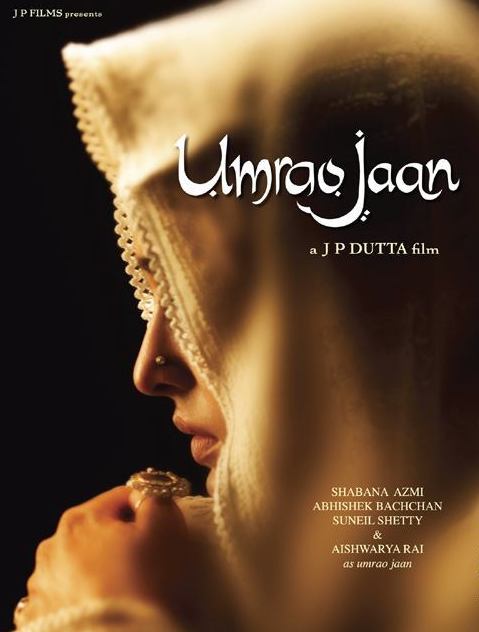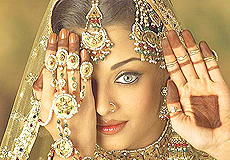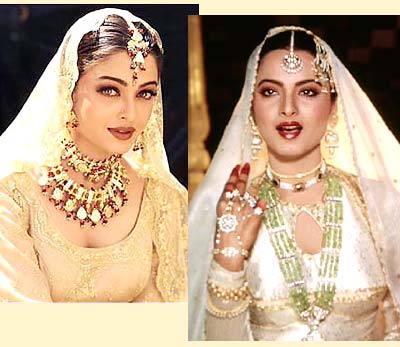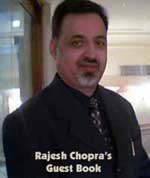 |
 |

|
Umrao
Jaan (romance)
Cast: Aishwarya Rai, Abhishek Bachchan, Shabana Azmi Direction: J P Dutta Valiant Mr Dutta! You require some guts to re-make a period romance like Umrao Jaan in an age when 'ishq' has become a synonym for speed dating and 'mohabbat' more of a one-night masti. More importantly, when Urdu is almost Latin and Greek for a generation that fails to understand even Gulzar’s poetry, leave alone a narrative that is heavily peppered with classical Urdu words of the Oudh variety. Naturally then, you not only have a million mispronounciations, but you also got to see your protagonist repeatedly say ‘Khuda’ minus the accent under ‘K’. Here, we must give kudos to Abhishek Bachchan who not only dots the i’s and crosses the t’s, but delivers his dialogues with impeccable finesse. In fact, Abhishek completely reinvents the role of the wimpish nawab played by Farooq Shaikh in the original and lends gravitas to the role. There is a studied grace to this 'pathan ka bachcha' who ends up as a dream lover — diehard and determined to remain faithful to the tawaif, despite parental opposition and societal pressure. Does Mr Dutta deliver? To begin with, the film is like an ornate canvas sprinkled with colourful art work. The kothas of Lucknow may lack the opulence of Sanjay Leela Bhansali's magniloquent sets of Devdas, nevertheless there is a splendour to the sundry ‘mujras’ which Aishwarya repeatedly renders. The romance between the nautch girl and the nawab too have an underlying passion, specially in the latter scenes. But what works against the film is its inordinate length and a certain plastic feel to the milieu. Some of the players not only fail to deliver the dialogues, they almost end up as farcical. The music too lacks shelf life and you walk out of the film without humming a single number. Aishwarya as Umrao? Aha! Now that's a toughie. Let's just say, she’s riveting in places, diligent throughout and tries so hard to recreate a lost world of grandeur that your heart almost goes out to her. Specially when somewhere under your breath you keep calling out for Rekha Jaan and her 'aankhon ki masti' that mesmerised you, not so long ago.  Wednesday, November 01, 2006 “I think in the history of Indian cinema it is for the first time that the mother and daughter have played the same part and for me of course it was a big challenge,” says Shabana Azmi, the actress of giant proportions who has done India proud in all the national and international forums. She is eagerly looking forward to enacting a role immortalized by her mother Shaukat Azmi in Muzaffar Ali’s ‘Umrao Jaan’. “Shaukat Azmi has played the part of Khanam Jaan with such perfection that people still remember her so I approached the role with some trepidation and also a lot of excitement because of the challenge. The fact that my mother was there, she helped me choose my clothes, familiarize me with the Avadh culture, help me with the pronunciation and the fact that I had her blessings,” says Shabana with a smile. Her father Kaifi Azmi was a well known poet and lyricist and her husband Javed Akhtar has penned the lyrics for ‘Umrao Jaan’. Many of you may not be aware that Shabana is a talented singer who actually sang all the songs of a film ‘Anjuman’ directed by the director of earlier ‘Umrao Jaan’ Muzaffar Ali. It’s but obvious that we had to take her opinion on the subject of the music of JP Dutta’s ‘Umrao Jaan’. “The music is outstanding and the music is also different because the earlier film had more of ghazal genre and this is much more the mujra genre and so the music is different and wonderful,” she signs off.  |
| Old UMRAO JAAN
1981, Hindi, 145 minutes Produced and Directed by Muzaffar Ali Based on the novel by Mirza Muhammad Hadi Ruswa Screenplay and dialogue: Shama Zaidi, Javed Siddiqui, Muzaffar Ali; Lyrics: Shahryar; Music: Khayyam; Choreography: Kumudini Lakhia, Gopi Krishna; Cameraman: Pravin Bhatt Muzaffar Ali’s adaptation of the first great modern Urdu novel, Umrao Jan Ada by Mirza Ruswa (1905), makes cinematic adjustments and compromises, but is a gem all the same. Whereas Ruswa interwove his fictional memoir of a 19th century tawayaf (courtesan or public woman) of Lucknow with a lively dialogic frame-narrative, in which the courtesan and author, both grown old, reminisce, tease one another, and quote copious ghazal poetry, the director presents a linear account of Umrao’s early life from childhood on, ending soon after the Rebellion of 1857 (a.k.a., the “Sepoy Mutiny”). Where the novel’s heroine is said to be plain, though blessed with a good voice and sharp mind, the film’s is…well, Rekha, here further endowed with the voice of Asha Bhosle singing ghazals that have all become famous. Where the literary Umrao admits to “never having really loved a man,” the cinematic Umrao has one great and lingering romance. The chronology of events is drastically altered as well, and of course a great deal is omitted. Nevertheless, Ali’s film is lovely in its own right, and apart from offering fine performances by renowned actors and gorgeous songs and dances, it succeeds remarkably well in capturing (through lovely cinematography and accurate period sets) much of the atmosphere of the novel, which both celebrates and problematizes the world of the chowk—the prostitute’s quarter of old Lucknow. It also conveys some of Ruswa’s surprisingly radical subtext: his meditation on the plight of upper-class women, whether begums (respectable but housebound wives) or tawayafs (alluring and educated but socially-disapproved courtesans), as birds equally caged by patriarchal double standards. It thus invites comparison with Kamal Amrohi’s PAKEEZAH (1971), which explores some of the same themes in a more allegorical register. The setting is Lucknow, capital of the northeastern kingdom of Oudh (a.k.a. Awadh), which broke away from the crumbling Mughal Empire in the mid-eighteenth century. After the cultural and economic decline of Delhi, many poets and artists moved eastward, seeking the patronage of the heterodox Shi’ite Muslim rulers of Oudh. Their capital became renowned for the refinement and exaggerated elegance of its Persianized Urdu, as well as for the decadence of its lifestyle, which revolved around the Nawab’s court and the prostitutes’ chowk. The British East India Company’s forceful annexation of Oudh and deposition of its last king in 1856 helped to precipitate the outbreak, the following year, of widespread rebellion against their rule. As the credits roll, we see the child Ameeran (Umme Farwa), a middle-class Muslim girl of Faizabad, being adorned, at roughly age twelve, for her engagement ceremony while women sing a traditional song. We soon learn that a neighbor of the family, Dilawar Khan, has a grudge against Ameeran’s father (whose testimony in a court case once sent him to prison); the vengeful Khan lures Ameeran from her house, then abducts her at knifepoint. Though he plans to kill her, a companion proposes instead taking her to Lucknow and selling her. After spending several days with a family who deal in stolen children, Ameeran and another frightened girl, Ram Dei, are both sold—the latter to a wealthy family (in the novel we learn that she is meant to be a sex-education toy for a young nawab or aristocrat). As the less attractive of the two, Ameeran is taken to Lucknow and sold to Madame Khanum (Shaukat Kaifi), the keeper of a high-class brothel where dandified gentlemen, wrapped in costly brocaded shawls and fortified by tobacco and opium, pass their evenings engaging in (for starters) witty conversation, musical recitals, and the chewing of paan (a mildly-addictive spiced betel preparation). But to the child, whom Khanum promptly renames Umrao and who understands nothing of the brothel’s commodity culture, it seems a magical and luxurious place, especially after her horrific ordeal. She has no hope of returning to her family (many days journey away) and is “adopted” by kindly Auntie Husaini (Dina Pathak), Khanum’s matronly servant. |
|
|
 |
 |
 |
 |
|
LiveIndia.Com Copyright
© 1998-2001 Live India Internet Services! All rights reserved
|